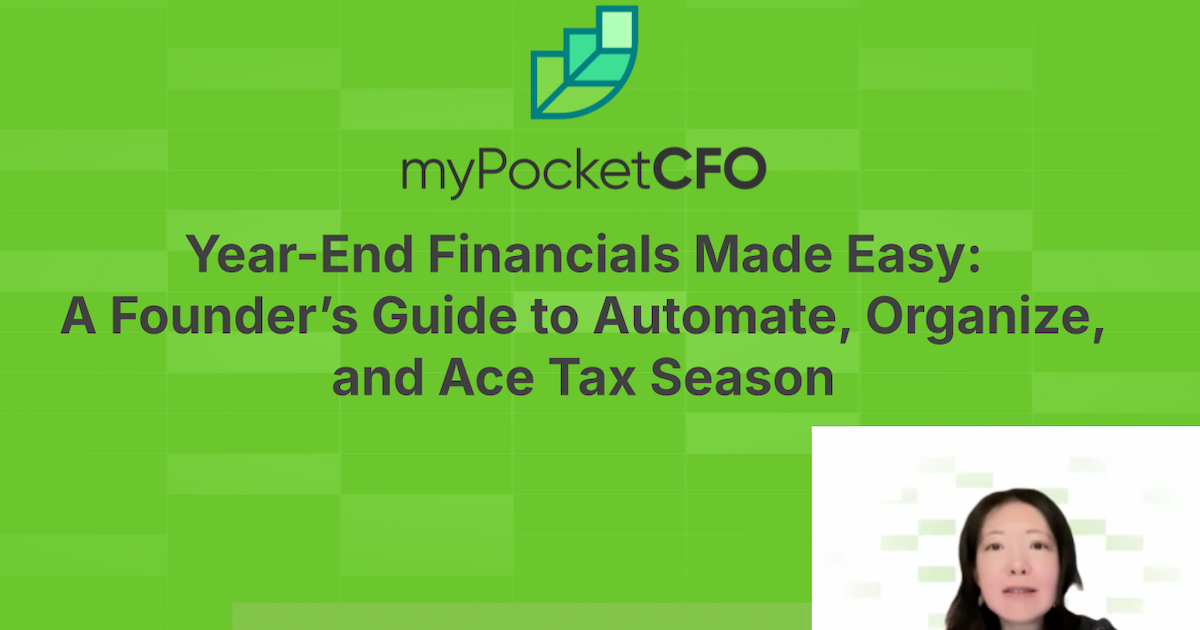As the new year begins, closing your financial books for 2024 is likely a top priority. Many founders in our community have been asking how to efficiently finalize their year-end financials to ensure tax readiness, investor transparency, and better financial planning. To simplify this process, we recently hosted a webinar on how to close your books quickly and accurately using myPocketCFO. Here’s a recap of the key insights shared by Alice Zhang, co-founder and CEO of myPocketCFO.
Why Accurate Financials Matter
Ensuring your financials are up to date isn’t just about filing taxes — it has broader implications for your business. Properly closed books can help you:
- Avoid tax penalties – Filing your taxes on time with accurate financials is crucial to staying compliant.
- Secure investor and lender confidence – Investors and lenders will request your 2024 books to assess your company’s financial health.
- Make smarter decisions – A clear financial picture allows you to plan effectively for 2025 and beyond.
Three Simple Steps to Closing Your Books
Alice outlined a straightforward, three-step approach to simplify the process of closing your books using myPocketCFO.
Step 1: Choose an Automated Accounting Platform
Using an automated accounting system like myPocketCFO significantly reduces manual work. The platform links to your financial accounts, automatically categorizing transactions and generating reports. If you’re using another system, ensure that all relevant data is centralized and accessible.
Step 2: Ensure Proper Revenue & Expense Categorization
To generate an accurate income statement and balance sheet, your transactions must be categorized correctly. Here’s what to focus on:
- Revenue Recognition – Ensure all sales channels (e.g., Shopify, Amazon) are properly linked and reconciled.
- Cost of Goods Sold (COGS) – Validate that your cost rules align with your business operations.
- Expense Categorization – Properly document vendor payments, salaries, and operational costs to prevent discrepancies.
- Balance Sheet Review – Confirm that assets, liabilities, and equity accounts reflect your company’s actual financial position.
Step 3: Conduct a CPA Review and Final Adjustments
Once your books are drafted, the final step is reviewing them with your CPA. myPocketCFO offers CPA-assisted reviews to help flag missing transactions, reconcile discrepancies, and ensure accuracy. Some key adjustments to focus on include:
- Inventory Adjustments – Year-end physical inventory counts must match recorded balances.
- Loan Reconciliation – Ensure loan balances and interest payments are accurately recorded.
- Receivables & Payables – Align outstanding invoices and payments with your records to maintain financial clarity.
Common Mistakes to Avoid
Many early-stage founders encounter common pitfalls when closing their books, such as:
- Mixing personal and business expenses – Maintain separate bank accounts and notify your CPA of any incorrect transactions.
- Missing transactions – Ensure all revenue and expense sources are linked, while also avoiding duplicate entries.
- Delaying the review process – Start early to prevent last-minute stress and errors.
Final Thoughts
Closing your 2024 books doesn’t have to be daunting. By leveraging automation, ensuring proper categorization, and working closely with your CPA, you can finalize your financials efficiently and set your business up for success in 2025.
If you’re looking for a seamless way to manage your books, myPocketCFO offers a free 7-day trial to help you get started. Sign up at app.mypocketcfo.com and take control of your financials today!
Download the bonus guide: 2024 Year-End Financial Book Review Checklist for Founders





